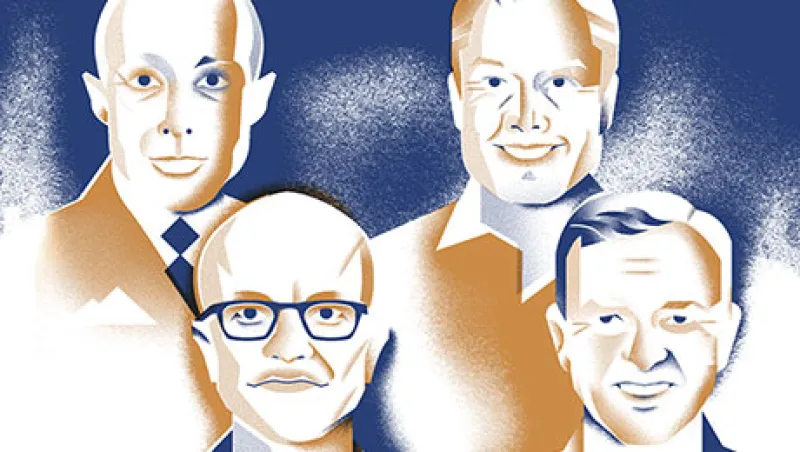When a company makes a strong showing in the financial markets, chances are that it’s the result of a decision made several years ago, not one based on last quarter’s numbers. The best executive teams in some of the bedrock U.S. industries understand this dynamic, and they excel at helping investors grasp it too. We spoke with several of the top CEOs on Institutional Investor’s 2017 All-America Executive Team to learn how they think about shareholder value.
Union Pacific Corp., founded in 1862, is one of the oldest companies in the U.S.; among the few railroad operators with a network that stretches from coast to coast, it also signals the health of the rail system. In the new world of driverless long-haul trucks, drone deliveries, and Hyperloop, Lance Fritz’s role as chair and CEO of Union Pacific may seem like a throwback to a bygone era. But in the first three quarters of 2016, the company returned some $3.6 billion to shareholders by way of dividends and stock buybacks, Fritz tells Institutional Investor.
The trains of today are cleaner, greener, and a little faster, making long-distance travel more efficient. Union Pacific started investing in more-sustainable trains several years ago, a move that has led to cost savings through better technology and lower fuel consumption. Although commodities have slumped in recent years, they’re starting to show signs of life, a trend that could help to offset a secular decline in demand for new rail cars.
Union Pacific is focused on operating an efficient rail network, and its dividend strategy adds another layer of certainty for investors during cyclical lulls, Fritz contends. “Our financial team is integrated within the fabric of the company, ensuring new business is reinvestable and capital investments generate an attractive return,” he says. “This discipline creates value for our shareholders and delivers significant returns.” As of November 11, Union Pacific’s stock was up just over 18 percent year-to-date, closing at $96.88.
Ronald Mittelstaedt, who has served as chief executive and a director of Waste Connections since the sanitation services provider launched in 1997, wins the top CEO spot in the Business, Education, and Professional Services category.
Mittelstaedt’s long tenure keeps him philosophical about reactionary markets and finicky shareholders. “Value creation doesn’t generally happen by accident; it’s something you have to be purposeful about over five, ten, 15, 20 years,” he says. “You have to ingrain it in the culture of the company.”
For Mittelstaedt, building shareholder value centers on knowing when to listen to markets and when not to. In his view, the problem for some companies is that “you have to look at your overall strategy and determine whether it is a strong long-term strategy and whether you have the fortitude to stand by it for several years into the future, even if your peers are changing their strategies all the time,” he explains.
Managers who fixate on short-term pops in performance can lose control of their playbook, Mittelstaedt adds. “Companies get too focused on letting the market and investors pick the strategy,” he says. “That’s a function of not being proactive in terms of deciding on the best direction for your company and communicating that to investors effectively. You have to know your business and show your work so performance expectations are aligned across the stakeholders.”
Mittelstaedt’s perspective, which he expresses not only in business strategy but through quarterly in-person, one-on-one investor meetings, has made Waste Connections one of the most reliable performers in the large-cap space. The company’s stock closed at $73.92 on November 11, a gain of more than 55 percent for the year.
Union Pacific’s Fritz and Waste Connections’ Mittelstaedt get at the core of how executive teams rise to the top of the ranking: They play the long game, and they aren’t afraid to be transparent about it.
“Business cycles don’t change month to month,” says Ronald Epstein, a managing director and senior analyst at Bank of America Merrill Lynch who covers aerospace and defense. Lockheed Martin Corp., the Most Honored Company in that category, laid the groundwork for its leading position eight years ago by creating a share buyback and dividend strategy that its peers now copy.
Those benefits to shareholders provide yield during what might be sleepy business cycles. “When you think about the sector, the cycles are decades long,” Epstein notes. “The 737 was developed in the 1960s.” To plan for profitability and investment performance over the long haul, Epstein says, aerospace companies must complement shareholder perks such as buybacks and dividends with growth opportunities like making new parts to keep their aircraft maintained.
In the end, the strength of a company’s executive team may be one of the more reliable metrics for judging a potential investment. At Lockheed Martin and the other companies on the 2017 All-America Executive Team, CEOs focus on having a strong mix of current execution and future value creation.
“It’s important to be able to tell investors your story but also to execute on that story,” says David Cote, CEO of industrial conglomerate Honeywell International, the winning chief executive in the Electrical Equipment & Multi-Industry category. Building a future for the company means taking the time to get new products right, but shareholders also want consistent performance.
“For example, Honeywell’s fluorine products molecule took ten years to come to market,” Cote explains. “Investors were not going to wait for performance to catch up. We had to continue to perform while balancing expectations and delivering results quarter by quarter and year-over-year.”
The Most Honored Companies will be honored at an awards dinner, taking place on March 7, 2017, at the Mandarin Oriental in New York.






